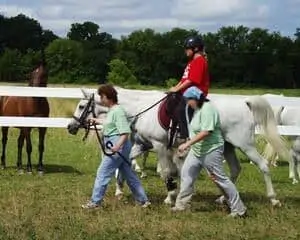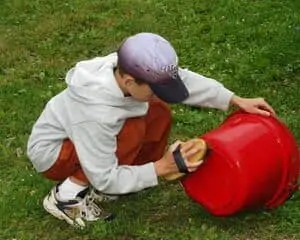LEARN ABOUT EAAT (from pathintl.org)
What Are Equine-Assisted Activities and Therapies?

Throughout the world, hundreds of thousands of individuals with and without special needs experience the rewarding benefits of equine-assisted activities and therapies (EAAT). A physical, cognitive, or emotional special need does not limit a person from interacting with horses. In fact, such interactions can prove highly rewarding. For instance, experiencing the rhythmic motion of a horse can be very beneficial. Riding a horse moves the rider's body like a human gait, so riders with physical needs often show improvement in flexibility, balance, and muscle strength.
What Is Equine Facilitated Psychotherapy & Equine Facilitated Learning?
Equine-facilitated psychotherapy (EFP) and equine-facilitated learning (EFL) are experiential forms of psychotherapy and learning that involve equines. These are fast-growing disciplines in the equine industry. PATH Intl. provides standards of professionalism and safety for people working in those disciplines.
The equine is a critically important partner in the work of both EFP and EFL. The equine’s prey nature and intense sensitivity to subtle changes in their environment make them perfect partners for professionals who teach a wide range of life and coping skills.
The concept that horses might be helpful or healing to people struggling with mental health issues is based on the idea that horses (as domesticated prey animals) are extremely sensitive to changes in the human being (as a predatory creature). Due to their sensitivity, horses react and respond to people differently based upon the person's emotional state. Since we know that emotional states in human beings also impact our physiology, it only makes sense that horses can smell or sense (using their vomeronasal organ) those changes. The horse acts as a large biofeedback machine, providing the client and the therapist with information regarding the client's moods and changes within those moods. If a client arrives anxious the horse will act and respond one way. If the client can reduce his or her anxiety, the horse's behaviors will also change. This provides a plethora of information and skill-building opportunities for both the client and the therapist.

In an educational setting, horses and the lifestyle that goes along with maintaining horses provide opportunities to teach critical life and communication skills. Horses mostly use non-vocal communication and thus are wonderful teachers to help us better understand and learn how our non-verbal communication might be impacting or influencing others in our lives. Horses also demand that we are aware of our surroundings at all times. To stay safe around horses, we must be observant and present in our bodies. We have to listen to each other and the horses. We have to stay focused and attentive. To care for horses takes dedication, time, and effort and our clients can learn a strong work ethic that may transition back into their daily lives. Furthermore, clients gain self-esteem and self-confidence while learning how to work with such a large and powerful creature. In all, horses provide us with a way to see our internal landscape and modes of operation exposed. They offer us humility, compassion, and challenge - all critical elements to supporting self-growth and self-awareness.
